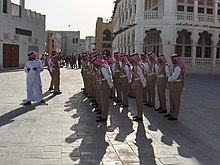


Law enforcement in Qatar comes under the control of the Ministry of Interior of Qatar, which administers the various law enforcement agenciesofQatar. Both women and men can be admitted to law enforcement agencies in the country, provided they attend a police academy before being admitted.[1]
The first police agency formed in the State of Qatar was the 'Discipline Police' in 1949. This agency began its duties in 1949 at Doha Police Section which was located in the centre of Souq Waqif. The functions of this section consisted of providing security protection for citizens, maintaining discipline by moving patrols, carrying out the mission of permanent guards at vital areas in the capital and organising traffic movement. It also carried out all other police related duties such as conducting investigations on criminal and traffic cases and referring the accused to the courts.[2]
In response to widespread protests which broke out in Qatar in 1956, then-emir Ali bin Abdullah Al Thani began heavily investing in the police force. As a result, a new police headquarters was built during the 1950s.[3]

The various law enforcement agencies of Qatar are under the authority of the Ministry of Interior's General Directorate of Public Safety,[4] which was created in 1970.[5]
There are numerous law enforcement agencies and departments in Qatar, with each one being responsible for a different aspect of policing. These include, amongst others, the Rescue Police Department (Al-Fazaa),[6] the Juvenile Police Department[7] and the Airports Security and Passports Department.[8]
The Rescue Police Department, or Al-Fazaa, was established in March 2009 by the Decree of Minister of State for Interior Affairs No. (13) of 2009.[9] It is responsible for the organization and arrangement of police patrols through all regions of the Capital and the area of competence of the Al-Rayyan Security Department, providing pro-active police services to prevent crime before it occurs, responding to emergency calls from the public and for providing support and assistance to all of the Ministry's departments.[10]
In 1989 the Juvenile Police Department was established as a stand-alone department by the Minister of Interior in accordance with Article 5 of the Juveniles Act and is under the remit of the General Directorate of Public Safety.[11] The department got its mandate from the Juveniles Act, which defines the department's duties and responsibilities. Its primary responsibilities under the Act are as follows:[12]
The department holds the power to detain delinquents for a period not exceeding 48 hours if "circumstances demand for it", but a court may order for an extension to that period.[13]
The Airport Security and Passports Department (ASPD) is responsible for the direct supervision of entry and exit from and to Qatar, and was established as an independent entity in 2004 by Ministerial Decree No. (37) of 2004 under the authority of the General Directorate of Public Safety.[14] The department specialises in security and service tasks related to the daily dealing with the public, as well as taking measures to maintain security and regulate the traffic through Hamad International Airport.
Qatar State Security is a branch of the Ministry of Interior which are responsible for matters relating to political disputes, terrorism, and espionage. They were formed as a result of a merger between the Secret Police Office and Investigation and State Security Service.[15]

Police officers are required to attend the police academy in Doha before they can be admitted into the force.[1] Historically, the police force was overwhelmingly composed of males. There were only 30 females in the police force prior to 2003. That year, a whole female squadron with 107 women graduated from Qatar's police academy for the first time in history.[4]
In December 2013, Qatar's emir Tamim Al Thani passed a decree to establish a four-year police college. A police official stated that the objective of establishing the institution was to create a highly trained police force which would be able to maintain security in large events such as the 2022 FIFA World Cup.[16] The college opened in August 2014 with an enrolment of 130 students and a budget of QR 2.5 bn. Successful students will graduate with a bachelor's degree in law and police science, and will automatically earn the rank of lieutenant.[17]